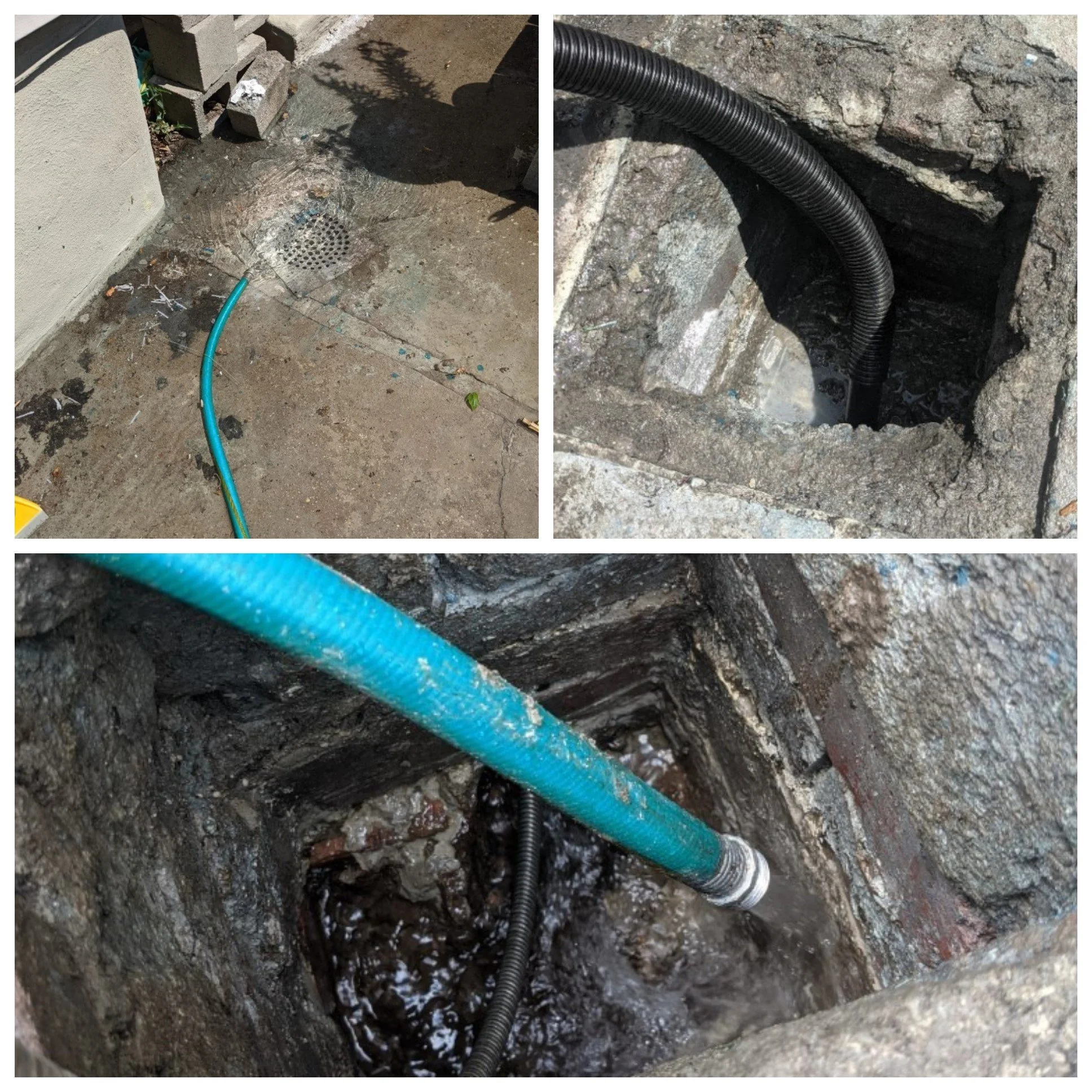Contractors That Can Cause Clogs
Shown here Slurry being removed with a Shop-vac from a backyard floor drain then snaked and flushed
Not all contractors are the same.
There are important considerations that every homeowner must think about when choosing contractors. I will impart some scenarios from experience. Word of mouth referrals, quality of materials, price and actual proof of work is the best way to weigh your options of which contractor to choose. But there is an additional question to ask your contractor about how the job is done and it's important. To a masonry contractor you should ask; "What do you do with any leftover cement or slurry?". If they tell you that they make just enough, don't believe them. If they tell you they take it with them, don't believe them. If they tell you they might water it down and dump it in the most convenient floor drain then that's realistically what's going to happen. I don't want to call anyone who does this an evil moron. I think that they rationalize it in their minds that if it's watered down enough, it'll all flow away. The actual result is simple.
When slurry is dumped into a drain, the water flows out faster and the heavier sand, aggregate and other solids slow down and solidify over time. The damage is done when the job is done. The contractor at fault has been paid and is ignorant of the problem they caused. This problem may take time to show depending on the severity of the clog. This is why someone should literally stand over them when they work to check what they do with the leftover masonry product. They may try to explain that dumping watered down slurry is common practice and they do it all the time. Without the need for argument, ask them to leave it in a bucket or take it with them. If they leave behind the bucket, it'll be easier to find a way to dispose of that then dealing with a long-term sewer issue. Otherwise this can create major long terms issues with repeat clogging that won't go away.
Similar to masons, tile contractors can also cause sewer issues. A tile contractor confessed to me that when working in Manhattan, leftover thin-set mortar is watered down and flushed down the most convenient toilet. He explained, "This is done because it is impractical to waste time going up and down the elevator in a tall building". I would imagine these buildings after multiple contractors and multiple renovations, it's only a matter of time and they will inevitably clog too.
The last part of this blog is about roofing contractors. Without doing anything purposefully, some roofing material has a sandy coating. Over time, granules can run-off and build up a few years after a new roof was installed. Usually, this is an easy fix. The granules will sit in the house trap. It is good practice to check your house trap annually and if there is any build-up to run a hose into a storm drain while stirring up the trap with an auger. There are other situations that seem to present themselves immediately after a contractor leaves. I've had the repeat experience when a roofer or gutter contractor was just at a house and now there's a major clog. It's happened over a dozen times and sometimes perplexes me. Before leaving and because of the contractor, a can or bottle will go into a vent or gutter. When an empty beverage can/bottle ends up in the storm drain trap then it is possible through carelessness that it rolled into the gutter and disappeared. Inevitably it'll end up stuck in the storm drain trap that hopefully will be noticed before any major storm. There are situations where it is purposeful. When a can/bottle is stuck in a sewer pipe or house trap, it most likely was dropped into a vent. Vents extend above the roof so someone has to make the effort to drop the beverage can/bottle in there. Unless it is malicious, why would a contractor do this? Most likely, it's a habit. Anyone with construction experience has seen what's inside floors and walls. There are always decades old coffee cups and beer cans hidden like time capsules. Here, they go unnoticed because they aren’t a real problem. But a can/bottle in a drain becomes an instant problem. It may be a sign of being sloppy or just a sad part of human nature to leave a mark somewhere where the unfortunate result is flooding.
If you like this info, please forward this post to someone who’d appreciate it also. Stay Clog-Free!

